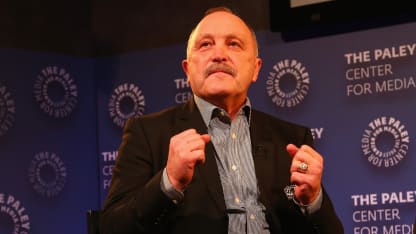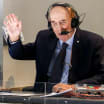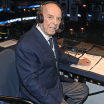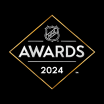When I was 7 years old, my mom would ask me what I wanted to be when I grew up.
"I want to be a teacher," I told her.
I had really good teachers when I was young, which are impressionable years on a kid. I admit that I was probably a bit of a teacher's pet, but I really enjoyed school. I wanted to do well for my teachers because they were all so good to me and made me feel good going to school.
Ever since I was a child, school has always been a big part of my life. I love talking to kids about the importance of controlling your ego, how to build self-esteem, recognizing the strength of education and the foundation it provides. The message of staying in school and pursuing your dreams is vital.
It's particularly important in First Nation kids, because I know how shy and talented they are. It's why I spend so much of my time spreading that message to aboriginal children.
I was fortunate to appreciate diversity from an early age, with my mom being Irish and my dad Cree Metis. They stressed to me how any name-calling that took place, even at a young age, was simply jealousy and to not let it hurt my feelings. It didn't. When they were done name-calling, I'd say, "Yeah, OK, whatever. Want to go play?" It wasn't a big deal to me.
By the time I left for Swift Current to play junior hockey in 1972 as a 16-year-old, there was so much diversity. It was embraced. I was only about 70 miles from where I grew up in a small town in Saskatchewan, but looking back, my name was a little hard for people to pronounce. I'd think, "How come I don't have a name like Smith or Jones?" But it was all part of the fun and recognizing there's a uniqueness and you had to embrace it.
The indigenous aspect wasn't tough for me because my parents did such a great job preparing me for that time, when it was no-holds-barred in society with name-calling. I had thick skin really early.
Being drafted by the Islanders in 1974 was a scary excitement and the next stepping stone. I remember before getting on the plane in Saskatoon, I told my mom, "Pack every stitch of clothes I have. I'm not coming home." She was proud of me for thinking that way. It was the attitude I had to have if I was going to fulfill my dream and play in the NHL.
Still, I cried the whole time while I packed my suitcase. It was exciting. I kept saying to myself, "I'm not coming home. I've got to make it." My parents walked me all the way to the plane (it was a different world back then), and I was boarding I couldn't look back. It was Christmastime when mom and dad came to New York, and it was the first time I had seen them since I had left for New York and apologized to mom then because I didn't look back at her and my dad. It was just too hard to say goodbye.
I don't know how big an inspiration I am for indigenous children, but I want to wear it with all my might. There's a certain pride I think we all have in where and how we grow up and our heritage. There's a lot of variety in First Nation; it's a very diverse group. Some of them feel self-conscious about the blend they have, that maybe they're not 100 percent First Nation. But they have the blood lines, and they're very creative and they're very athletic and talented. They all have the ability to make a difference, and I tell them it's OK to be homesick, but to remember it takes courage to live your dreams.
Truth be told, you never stop teaching. I'm a parent, and that's a job that never ends. Your conduct is always so important, because the kids are watching. They see what you're doing way more than what you're saying.
Winning the Stanley Cup six times as a player and once as a coach, you always hope your successes inspire kids, and I want with all my might to inspire young athletes -- not just First Nation kids, but young athletes in general. I'm so proud how that reflects on hockey players such as myself, how we care about the next generation of athletes and how important it is to give back to the communities.
It's great to see the NHL spreading that message too.


















